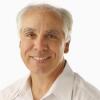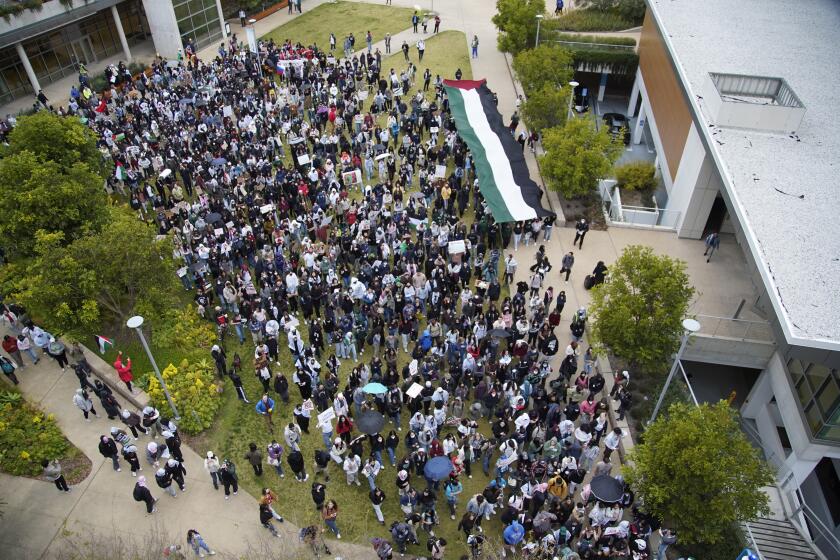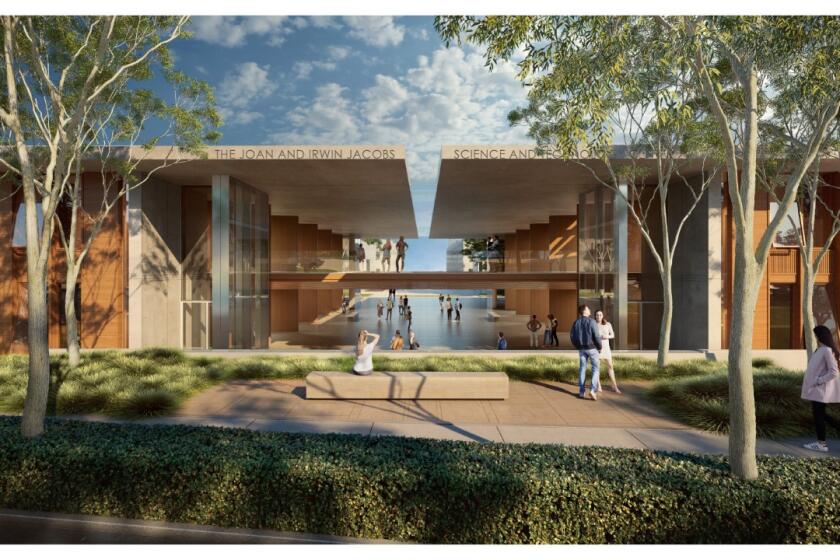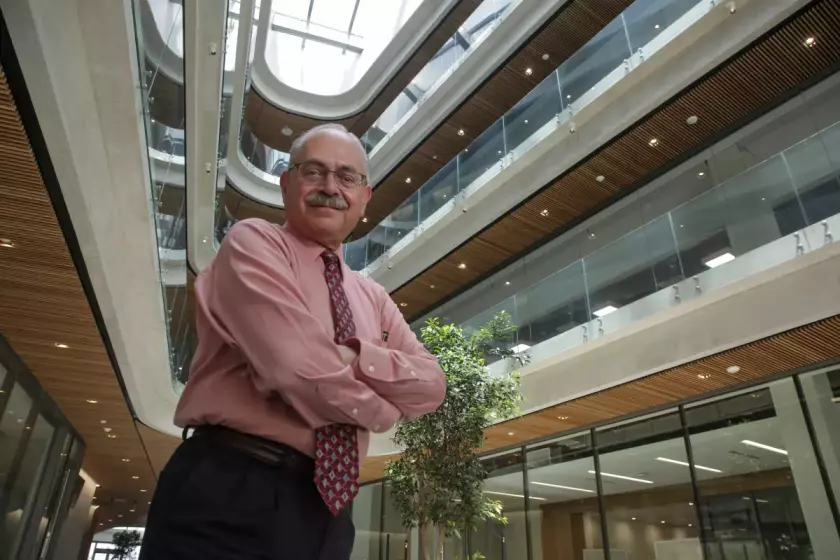The new dean of UC San Diego’s School of Medicine wants to make life less nerve-wracking for patients
Basketball Hall of Famer Bill Walton used to suffer such excruciating pain from a variety of health problems he says he considered committing suicide.
Dr. Steve Garfin saved him.
Garfin is the UC San Diego orthopedic surgeon who performed an 8.5 hour operation on Walton in 2009 that eliminated the chronic pain he had been suffering for decades.
Walton talks about Garfin often, putting him in a spotlight that’s about to get much brighter. He just assumed the position of interim dean of the UC San Diego School of Medicine, which is one of the most high profile health care jobs in Southern California.
The Union-Tribune spoke to Garfin last week, just as he was beginning to settle in.
Q: You’ve been an orthopedic surgeon for decades. Now, you’re about to cut your surgical practice roughly in half to ensure that you have enough time and energy to serve as dean. Did you wrestle with that decision? How did it hit you emotionally?
A: While it’s true that I won’t see as many patients one-on-one anymore, I’ve been thinking a lot about something one of my relatively younger, but astute former trainees said to me last summer.
He asked me how many patients I’ve operated on over the years. I said probably thousands. More importantly, he asked, how many residents and spine fellows I’ve trained. Probably hundreds, I said. Then he emphasized that I have also taught and/or influenced innumerable spine surgeons world-wide over the years with lectures, courses, books, and articles. He then said, “So even when you’re not operating, every day somewhere a patient is still benefiting from a ‘Garfin’ surgery.”
That really made me look a little differently at my work and what I’ve accomplished, and made me think about where I can be most effective for the rest of my career. In my new role as interim dean, I hope to touch even more lives indirectly through education and system-wide improvements than I would if I simply stayed full-time in my surgical practice.
Q: Former UC San Diego Chancellor Dick Atkinson told me to get out of his office a few years ago when I asked him why he continued working in his 80s. I get that; age is a sensitive topic. But the subject interests people. You’re 71. You don’t seem to have the need to slow down and smell the flowers. Why?
A: I love being a surgeon, and I love academics. I don’t feel any different than I did 10, 20 years ago — my mind and body are still strong. I regularly do complex spine surgeries that can take up to 12 hours. But I’m starting to wonder how my patients see me. I wonder if they worry about having an older surgeon, when I have so many younger, highly capable colleagues who could also do the job. So in one sense by reducing my time in the OR, I am slowing down. But on the other hand, I’m just getting started.
Q: What can you accomplish as a dean that you can’t accomplish as a surgeon?
A: At the UC San Diego School of Medicine, we already have a strong global reputation for research. UC San Diego Chancellor Pradeep Khosla and Vice Chancellor David Brenner are looking to me to bring my clinical practice, administrative, and clinical research expertise into this role as interim dean, to improve the patient experience and bake that into our medical school experience.
This isn’t unique to UC San Diego, but when patients have a health problem, they are nervous about it to begin with. Then they have to find a doctor and that makes them nervous. Scheduling an appointment makes one nervous. Finding the location and parking makes them nervous. Then being late because they got lost makes them nervous. Then forgetting what they heard and have to do, trying to ask all the right questions, while probably retaining only about 10 percent of what the doctor said, then being sent off for labs and imaging… none of it helps their nervous emotional state.
It is difficult being a patient. We already provide excellent, leading-edge medical services, but health care is nerve-wracking for everyone, everywhere — we have to, and can, make it better.
Q: Both you and Dr. Brenner have said that you want the medical school to train physicians to be more compassionate. I guess I assumed that med schools already do that. Are medical students not getting all of the training they need?
A: When I was in medical school, there was an immense amount of things we had to learn. Today’s medical students still need to know most of that, plus a lot more. There has only been an explosive growth of knowledge, with no loss of anything in our past. Not unlike K-12 schooling, we still take the summers off, yet have an ever-growing body of knowledge to learn.
In 2010, at UC San Diego School of Medicine, we turned the standard medical school curriculum on its head and now instead of teaching the old pillars like pathology and histology in “isolation,” we teach courses by organ system.
That means medical students learn what we feel they need to know from basic biology to disease diagnostics to advanced medical interventions for each organ system — the heart and circulatory system, respiratory system, nervous system and so on — with a patient- and person-oriented approach. We’ve also reduced their classroom time in order to give them more time for interactive, hands-on clinical experiences, and mentoring with faculty.
And yes, along the way, we of course still teach bedside manner. Our students even work with actors portraying different patient scenarios. But as technology plays an increasing — and welcome — role in health care, I don’t want to lose the human element. We don’t want patients looking at their doctors’ backs because the doctor is so intent on inputting everything into an electronic medical record, and that he or she (the physician) seems to ignore the patient.
Q: I read an academic paper that says that, over the decades, medical school deans have gone from being patriarchs to CEOs. Is that true? The letters CEO sound dispassionate to me, especially as applied to medicine.
A: Well, I don’t relish the idea of being any of those things. I think I’d rather be more of a mentor and a problem-solver. That this is the kind of place where you don’t go around just with complaints, bur you show up with solutions, and work in a collegial fashion.
Get the La Jolla Light weekly in your inbox
News, features and sports about La Jolla, every Thursday for free
You may occasionally receive promotional content from the La Jolla Light.




